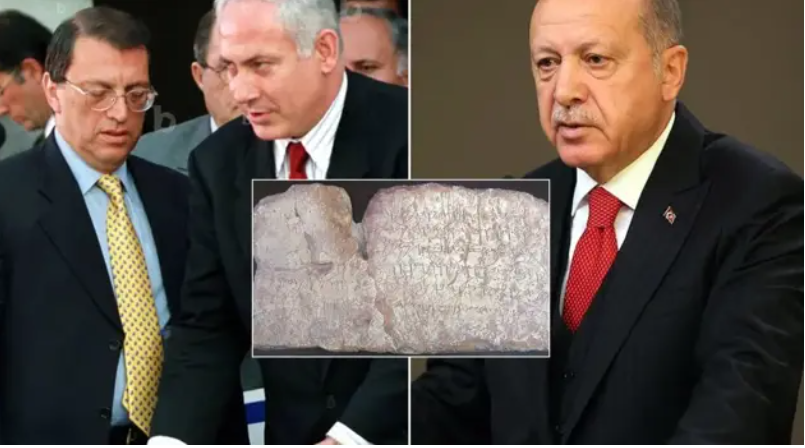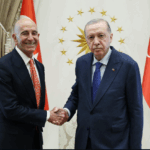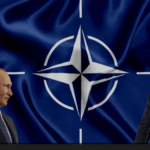On the geopolitical football field, Israeli Prime Minister Benjamin Netanyahu and Turkish President Recep Tayyip Erdoğan often seem like bitter rivals on opposing teams. Yet time and again, Netanyahu’s words end up as unwitting “passes” that Erdoğan can intercept and drive toward a score in domestic politics. The latest flare-ups – from Israeli officials applauding Erdoğan’s rivals to Netanyahu’s own proclamations about Jerusalem – have provided Erdoğan fresh opportunities to cast himself as the staunch defender of Jerusalem and the Muslim world, while painting his Turkish opponents as players compromised by Israeli favor.
The Siloam Inscription: An Ancient Stone, a Modern Claim
On September 15, Israeli Prime Minister Benjamin Netanyahu presided over a theatrical ceremony in Jerusalem’s ancient City of David – a site heavy with biblical history and political messaging. Standing amid recently excavated stones and flanked by American and Israeli flags, he unveiled the reopened Pilgrimage Road and pointedly addressed Turkish President Recep Tayyip Erdoğan by name. “This is our city, Mr. Erdoğan. It’s not your city. It will always be our city,” Netanyahu declared, vowing Jerusalem “will not be divided again.” In that moment, a 2,700-year-old relic became the centerpiece of a new geopolitical play: Netanyahu effectively crossed a symbolic ball into the court of his Turkish rival, inviting a grand response on the world stage.
At the heart of this drama lies the Siloam Inscription, a weathered limestone tablet originally discovered in 1880 within a water tunnel beneath Jerusalem. The ancient Hebrew script carved into the stone commemorates how two teams of diggers met to complete that tunnel – an engineering feat ordered by King Hezekiah nearly 2,700 years ago. Today, the inscription itself resides in the Istanbul Archaeology Museum, carried off during Ottoman times and kept there since 1883. For Netanyahu, the Siloam Inscription is more than just an artifact; it is a trophy of heritage that underscores Jewish civilizational roots in Jerusalem. In his City of David speech, he recounted how, as far back as 1998, he had implored Turkey’s then-prime minister, Mesut Yılmaz, to hand over the tablet – even offering “all the Ottoman artifacts in Israel’s museums” in exchange. Yılmaz flatly refused (“this has no price,” he retorted), warning that Turkey’s rising Islamist movement – led by none other than Istanbul’s mayor at the time, a young Erdoğan – would erupt in outrage if Ankara relinquished an artifact “showing Jerusalem was a Jewish city 2,700 years ago”.
By resurrecting this anecdote, Netanyahu cast the inscription as proof-positive of ancient Jewish presence, reinforcing his narrative that an undivided Jerusalem is eternally “our city.” The symbolic weight is enormous: a piece of stone morphs into political evidence, ostensibly legitimizing modern sovereignty via biblical-era history. More fundamentally, historians and legal scholars scoff at Netanyahu’s logic. If every relic of past rule justified present-day control, quipped one Turkish historian, “Romans can come and claim everywhere they ruled 2,000 years ago.” In international law, a long-ago presence in a city does not translate into perpetual rights – a point Ankara is keen to underscore as it dismisses Israel’s demands. The Siloam Inscription may be a proud link to Jerusalem’s antiquity, but as a foundation for 21st-century sovereignty, it is a shaky prop at best.
Erdoğan’s Counterattack: Seizing a Political Opening
Netanyahu’s provocation did not go unanswered. President Erdoğan, never one to shy from a high-profile spat, treated the moment as a political opportunity served onto his foot – a chance to volley back and energize his base. Within days, he responded with fiery rhetoric. “As Muslims, we will not take a single step back from our rights over East Jerusalem,” Erdoğan proclaimed in a televised speech from Ankara. He cast Jerusalem as a sacred trust for all Abrahamic faiths and vowed to continue the “struggle” until the holy city becomes a place of peace and security for everyone. Erdoğan pointedly reminded Netanyahu of the Ottoman era, when Istanbul’s sultans ruled Jerusalem for 400 years and (in his telling) ensured it was a harmonious home for Muslims, Christians, and Jews alike. In a dramatic flourish, the Turkish leader even labeled Netanyahu a “Hitler wannabe” – incendiary language calibrated to resonate with domestic and Muslim-world audiences.
For Erdoğan, sparring with Israel over Jerusalem serves multiple aims. It allows him to posture as a defender of Palestinian rights and Islamic heritage at a time when his domestic credibility is under strain. At home, Erdoğan’s plate is full of trouble: an economic crisis with inflation still hovering around 33% and a persistently weak lira; a sweeping legal crackdown that has ensnared hundreds of opposition figures – from major-party leaders to elected mayors – on politically motivated charges; and even the government’s controversial practice of ousting opposition mayors and replacing them with state-appointed trustees in key municipalities. Each of these issues has fueled public discontent or protest, from soaring grocery bills to street rallies against the jailing of politicians. By latching onto Netanyahu’s Jerusalem broadside, Erdoğan deftly shifts the national conversation from these domestic headaches to a unifying foreign cause. He taps into a wellspring of popular sentiment in Turkey that views standing up to Israel as a matter of honor and Islamic solidarity. In confronting Netanyahu’s claim – and asserting Turkey’s own role in Jerusalem – Erdoğan essentially rallies his political home crowd, deflecting attention from Turkey’s inflation and institutional crackdowns toward an external drama where he can play the hero. The Turkish presidency’s communications carefully frame his stance as principled leadership of the Muslim world, rather than a diversion – but the timing is certainly convenient.
Israeli Praise for Turkish Opposition
This “assist” by Netanyahu to Erdoğan over the Siloam Inscription is not new. It fits a well-worn pattern in which Israeli figures—Netanyahu himself, but also officials like former Foreign Minister Israel Katz drop statements calibrated to land inside Turkey’s domestic ring and force the opposition to parry.
On March 31, 2024, Israel Katz publicly congratulated two of Turkey’s prominent opposition mayors on their local election victories and hailed Istanbul Mayor Ekrem İmamoğlu and Ankara Mayor Mansur Yavaş – both members of the opposition CHP – for fending off President Erdoğan’s party in the March 2024 municipal elections.
Pro-government media outlets in Turkey quickly piled on, spinning the incident into a narrative of foreign skullduggery against Erdoğan. One outlet noted that Katz – described as one of Israel’s “baby-killers” – “did not bother to hide his joy” over the opposition’s wins. The same article triumphantly reproduced Katz’s congratulatory post to İmamoğlu and Yavaş as an “open message” from Israel to Erdoğan. The implication was clear: Turkey’s enemies abroad (even a far-right Islamophobe like Dutch politician Geert Wilders was mentioned in the same breath) were celebrating the opposition’s success, casting a shadow of treasonous foreign approval over Erdoğan’s rivals. In Turkey’s polarized political climate, being cheered by the Israeli government is hardly a badge of honor – it’s more like an own goal for the opposition’s image.
In early August 2024, Katz posted againin Turkish on X, tagging @ekrem_imamoglu, and accusing @RTErdogan of “turning Turkey into a dictatorship”—citing the Instagram block (“57 million users”), cutting sports broadcasts after an Israeli win, threatening a democratic country, and harming Turkish exporters by cutting trade. The post went massively viral and triggered a firestorm in Ankara.
Within days, Katz followed with another Turkish post along the same lines—this time also tagging Mansur Yavaş—doubling down on the frame that Erdoğan’s posture toward Israel was wrecking Turkey and “eroding Atatürk’s legacy.” Turkish and Israeli outlets alike noted the targeting and the backlash.
Mindful of this perception, Ekrem İmamoğlu himself moved swiftly to do damage control. The Istanbul mayor – Erdoğan’s most prominent rival and now twice victor over the President’s party in the city – publicly rebuked the Israeli foreign minister’s comments. İmamoğlu “returned” Katz’s endorsement with a scathing retort, stating that Turkey would “not learn democracy and law from those with the blood of tens of thousands of children on their hands.” In the same breath, he added, “Yes, everything will be very beautiful – when Palestine is free”. By effectively rejecting Katz’s praise and affirming solidarity with the Palestinian cause, İmamoğlu tried to block any political shot that the government could take against him from this episode. The spectacle of an Israeli minister appearing to side with Turkey’s opposition thus backfired in spectacular fashion: it gave Erdoğan’s camp a new talking point, and even forced the opposition to cheerlead against Israel just to avoid looking suspect at home.
Rhetoric vs. Reality
Amid all the fiery rhetoric and political theatrics, one might believe Turkey and Israel were on the brink of a total break. Erdoğan himself has not been shy about threatening just that. In the wake of Israel’s Gaza war, he announced dramatic steps: cutting off trade, banning Israeli vessels from Turkish ports, and even closing Turkish airspace to Israeli aircraft. In public speeches, he thundered that relations would be severed as a matter of principle, casting the showdown with Israel in almost apocalyptic, civilizational terms. As the Gaza death toll rose, Erdoğan railed against Israeli war crimes and even floated taking Israel to international court. By late 2024, Turkey’s foreign minister Hakan Fidan told parliament that Ankara had “decided to sever all economic and trade ties with Israel,” reiterating that Turkish skies were closed to Israel’s planes. To hear the Turkish leadership, one would think a complete cutoff was in effect – the diplomatic equivalent of a red card, expelling Israel from Turkey’s game.
But the reality, behind the scenes, has been far more nuanced. In truth, Turkey and Israel never fully left the field. Trade, especially, has quietly kept flowing even as leaders exchanged insults. In fact, by the end of 2024 Turkey somehow ranked as Israel’s fifth-largest source of imports for the year, with Turkish exports to Israel totaling around $2.86 billion. This was despite Ankara’s highly publicized “full suspension” of bilateral trade. How is that possible? The answer lies in creative workarounds that speak to a compartmentalized relationship. Turkish companies and Israeli importers found circuitous routes to keep business alive. For example, goods that once shipped directly from Turkey to Israel were re-routed through third countries – Greece being a notable transit hub, where suddenly Turkish exports spiked and then made their way to Israeli ports. In other cases, products were labeled as destined for “Palestine” and offloaded at Israeli harbors like Ashdod, from which they would be transferred to Israeli buyers with a wink and nod. Even the oil kept flowing: investigative reports tracked crude oil shipments traveling from Turkey to Israel in 2024 (including Azerbaijani oil via Turkish pipelines), despite Ankara’s announced embargo.
Indeed, officials in Israel noted that some of Ankara’s harsh measures were never formally communicated or enforced to the full extent. Israeli airlines continued overflying Turkey in some cases, and both sides left a low-level diplomatic channel open even after pulling their ambassadors. The pattern suggests a tacit understanding: each capital allows the other a certain leeway for domestic grandstanding. Erdoğan can thunder about cutting ties to appease his supporters (and outflank Islamist hardliners), while Netanyahu’s government can respond in kind – but both stop just short of irreversible steps. The “game,” in essence, carries on in the background, even as the crowd is shown dramatic theatrics on the pitch.
Mutual Gains in a War of Symbols
Such public spats may appear personal, but it is profoundly political. Each player derives something from the other. Netanyahu’s hardline statements on Jerusalem, intended to assert Israeli sovereignty, simultaneously hand Erdoğan the ideological ammunition he craves to ignite passion at home. Meanwhile, Israeli figures congratulating Erdoğan’s rivals – perhaps meant genuinely or perhaps to needle Erdoğan – end up bolstering Erdoğan’s narrative that he alone stands against external conspirators. It is a remarkable feedback loop, almost like two star players who publicly trash-talk but privately know they are elevating each other’s game. Netanyahu continues to pass the ball – sometimes directly into Erdoğan’s feet with a Jerusalem pronouncement, other times indirectly by way of ill-advised praise for Turkish opposition figures – and Erdoğan continues to capitalize, scoring political goals as Turkey’s self-styled champion of Muslim causes.
In other words, for Netanyahu – embattled by the fallout of a devastating war with Hamas and facing unprecedented international scrutiny – the drama in Jerusalem is a chance to double down on a nationalist narrative of Jewish historical rights. At home, he reinforces the message that under his leadership, Israel will never cede Jerusalem; every ancient pathway and inscription is marshaled as validation of that cause. This plays well with his core supporters and distracts from mounting criticism over other issues (from security lapses to judicial overhauls). Even as a United Nations commission accuses Israel of potential genocide in Gaza and global protests mount, Netanyahu can point to the City of David and say: see, the world is against us reclaiming what is ours for millennia. The confrontation with Turkey thus bolsters his defiant, no-compromise image.
Erdoğan, on the other hand, gains a ready platform to assert religious and geopolitical leadership. By championing Jerusalem and lambasting Netanyahu, he wraps himself in the mantle of protector of Muslims and the oppressed—playing to both nationalist and Islamist galleries. Crucially, when Israeli officials name-check or praise Erdoğan’s rivals, he flips it into proof of “foreign meddling,” tarring the CHP as the party applauded by Tel Aviv. That forces opposition figures to overcompensate with anti-Israel rhetoric, while Erdoğan claims the moral high ground at home and paints critics as suspect. The vitriolic exchange lets him recast domestic opponents as sideshows to external threats, crowding out bread-and-butter grievances. Every headline about the Jerusalem quarrel, every tweet hailing him for “not bowing to Zionist arrogance,” is a small victory for an embattled regime. In essence, Netanyahu keeps passing the ball to Erdoğan, while Katz assists by praising Erdoğan’s opponents; as a result, Erdoğan’s approval among conservative segments tends to spike whenever he confronts Israel or the West on emotive issues like Palestine. Both leaders are savvy enough to know that such symbolic victories can shore up their positions, even as their real-world problems fester unresolved.
By: GEOPOLIST – Istanbul Center for Geopolitics







